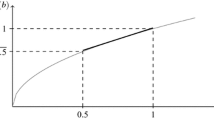Abstract
We consider a cumulative scheduling problem where a task duration and resource consumption are not fixed. The consumption profile of the task, which can vary continuously over time, is a decision variable of the problem to be determined and a task is completed as soon as the integration over its time window of a non-decreasing and continuous processing rate function of the consumption profile has reached a predefined amount of energy. The goal is to find a feasible schedule, which is an NP-hard problem. For the case where functions are concave and piecewise linear, we present two propagation algorithms. The first one is the adaptation to concave functions of the variant of the energetic reasoning previously established for linear functions. Furthermore, a full characterization of the relevant intervals for time-window adjustments is provided. The second algorithm combines a flow-based checker with time-bound adjustments derived from the time-table disjunctive reasoning for the cumulative constraint. Complementarity of the algorithms is assessed via their integration in a hybrid branch-and-bound and computational experiments on small-size instances.











Similar content being viewed by others
Notes
Although all results presented in this paper can be adapted when \(b_{i}^{min}=0\), for ease of notation, we assume \(b_{i}^{min} \neq 0\).
Indeed, suppose that f i is constant in some pieces the first one being p ∈{1,…, P i }, which would cause problem to compute \(f_{i}^{-1}\). In that case, f i must be constant on all pieces {p,…, P i } due to concavity. It follows that \(b_{i}^{max}\) can be reduced to the start of piece p.
References
Artigues, C., Lopez, P., & Haït, A. (2013). The energy scheduling problem: industrial case study and constraint propagation techniques. International Journal of Production Economics, 143(1), 13–23.
Artigues, C., & Lopez, P. (2015). Energetic reasoning for energy-constrained scheduling with a continuous resource. Journal of Scheduling, 18(3), 225–241.
BłaŻewicz, J., Machowiak, M., Wȩglarz, J., Kovalyov, M., & Trystram, D. (2004). Scheduling malleable tasks on parallel processors to minimize the makespan. Annals of Operations Research, 129(1–4), 65–80.
Derrien, A., & Petit, T. (2014). A new characterization of relevant intervals for energetic reasoning. In International conference on principles and practice of constraint programming, CP 2014 vol. 8656 of lecture notes in computer science (289–297). Springer International Publishing.
Erschler, J., & Lopez, P. (1990). Energy-based approach for task scheduling under time and resources constraints. In 2nd International workshop on project management and scheduling (pp 115–121). Compiègne.
Gay, S., Hartert, R., & Schaus, P. (2015). Time-table disjunctive reasoning for the cumulative constraint. In International conference on AI and OR techniques in constraint programming for combinatorial optimization problems, CPAIOR 2015, vol. 9075 of lecture notes in computer science (pp. 157–172). Springer International Publishing.
Ngueveu, S.U., Artigues, C., & Lopez, P (2016). Scheduling under a non-reversible energy source: an application of piecewise linear bounding of non-linear demand/cost functions. Discrete Applied Mathematics, 208, 98–113.
Hung, M.N., Le Van, C., & Michel, P. (2005). Non-convex aggregative technology and optimal economic growth. Cahiers de la Maison des Sciences Économiques 2005.95 - ISSN : 1624-0340.
Jensen, J.L.W.V. (1906). Sur les fonctions convexes et les inégalités entre les valeurs moyennes. Acta Mathematica, 30(1), 175–193.
Lahrichi, A. (1982). Ordonnancements. La notion de parties obligatoires et son application aux problèmes cumulatifs. RAIRO - Operations Research, 16(3), 241–262.
Lewis, J. Algebra symposium: optimizing fuel consumption. http://homepages.math.uic.edu/~jlewis/math165/asavgcost.pdf.
Nattaf, M., Artigues, C., Lopez, P., & Rivreau, D. (2015). Energetic reasoning and mixed-integer linear programming for scheduling with a continuous resource and linear efficiency functions. OR Spectrum, 1–34.
Nattaf, M., Artigues, C., & Lopez, P. (2015). A hybrid exact method for a scheduling problem with a continuous resource and energy constraints. Constraints, 20 (3), 304–324.
Nattaf, M., Artigues, C., & Lopez, P. (2015). Flow and energy based satisfiability tests for the continuous energy-constrained scheduling problem with concave piecewise linear functions. In CP Doctoral Program 2015 (pp. 70–81). Cork.
Vilím, P. (2011). Timetable edge finding filtering algorithm for discrete cumulative resources, Integration of AI and OR techniques in constraint programming for combinatorial optimization problems. CPAIOR 2011 vol 6697 of lecture notes in computer science. Berlin: Springer.
Wolf, A., & Schrader, G. (2006). O(n n) overload checking for the cumulative constraint and its application. In Umeda, M., Wolf, A., Bartenstein, O., Geske, U., Seipel, D., & Takata, O. (Eds.), Declarative programming for knowledge management. INAP 2005 lecture notes in computer science, Vol. 4369. Berlin: Springer.
Acknowledgments
The authors thank José Verschae for enlightening discussions. This study was partially supported by project “Energy-Efficient and Robust approaches for the Scheduling of Production, Services and Urban Transport”, ECOS/CONICYT, N◦ C13E04.
Author information
Authors and Affiliations
Corresponding author
Additional information
This article belongs to the Topical Collection: Integration of Artificial Intelligence and Operations Research Techniques in Constraint Programming
Guest Editors: Michele Lombardi and Domenico Salvagnin
Rights and permissions
About this article
Cite this article
Nattaf, M., Artigues, C. & Lopez, P. Cumulative scheduling with variable task profiles and concave piecewise linear processing rate functions. Constraints 22, 530–547 (2017). https://doi.org/10.1007/s10601-017-9271-4
Published:
Issue Date:
DOI: https://doi.org/10.1007/s10601-017-9271-4




